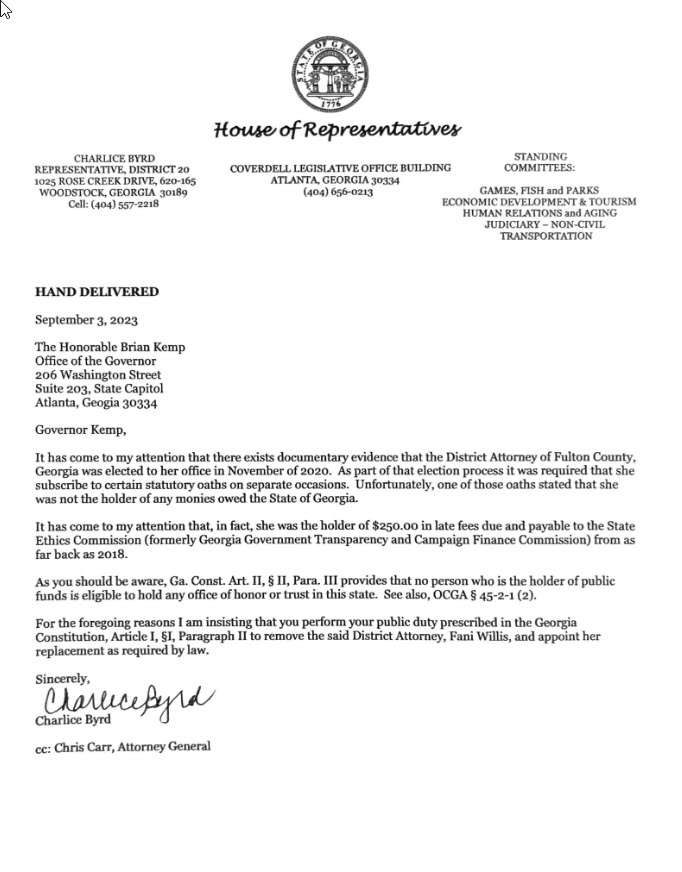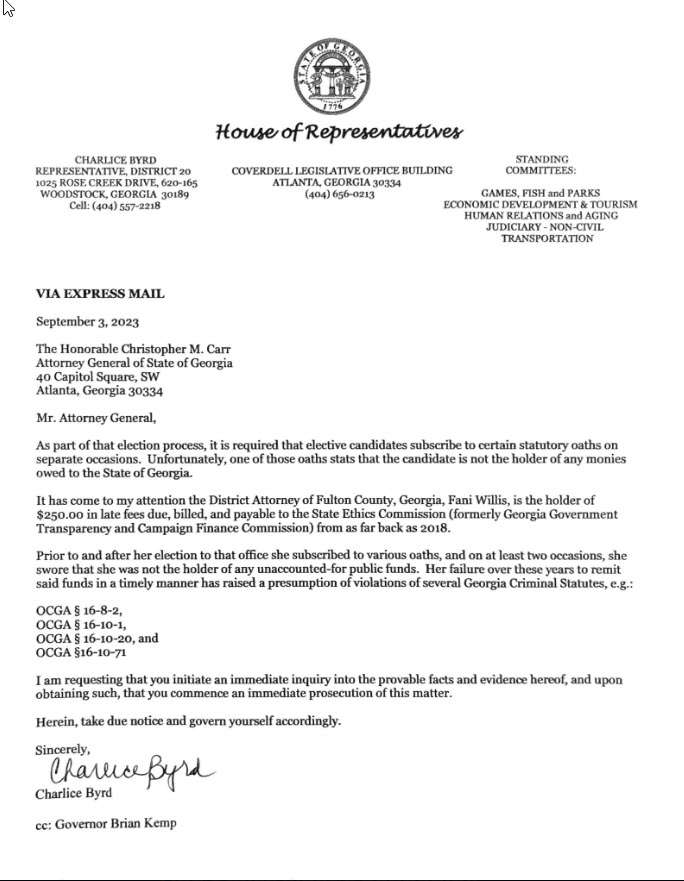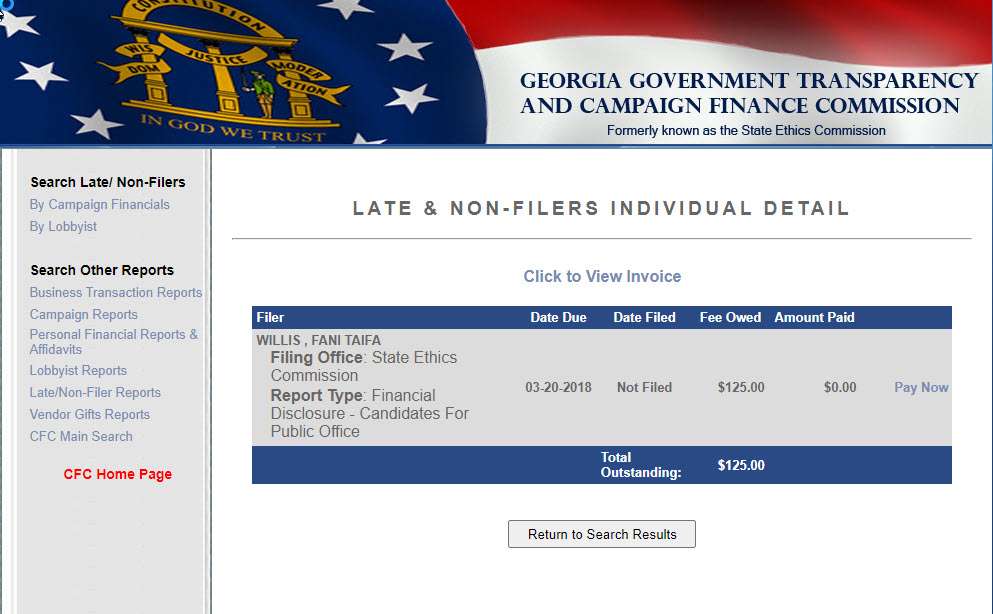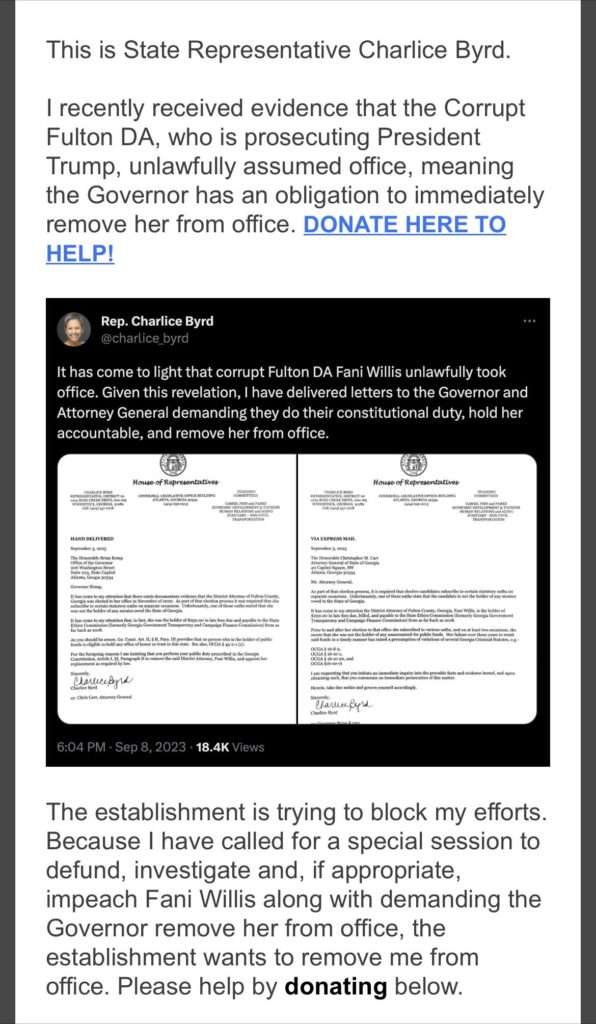A word about the Byrd
State Senator Colton Moore isn’t the only member of the Georgia General Assembly trying to cash in on the Trump indictment. Avid Byrd watchers in Cherokee County have likely noticed that State Representative Charlice Byrd has joined the fight, calling on Governor Brian Kemp and Attorney General Chris Carr (and instantly fundraising off her calling on Governor Brian Kemp and Attorney General Chris Carr) to remove Fulton County District Attorney Fani Willis claiming that Willis was never eligible to hold the office of District Attorney because she has violated her oath under the Georgia Constitution.


The issue at hand is an alleged $250 in fees that Byrd claims Willis owes in penalties to the Georgia Government Transparency and Campaign Finance Commission (formerly known as the “State Ethics Commission”, though Byrd reverses the names in her letters). Byrd is claiming that by owing fines, Willis is disqualified from holding office because the Georgia Constitution Art. II, Sect. II, Para. III states, “No person… who is the holder of public funds illegally shall be eligible to hold any office or appointment of honor or trust in this state. “Additional conditions of eligibility to hold office for persons elected on a write-in vote and for persons holding offices or appointments of honor or trust other than elected offices created by this Constitution may be provided by law.”
Once again, we have an instance of a lawmaker either completely ignorant of the laws of the State, or, worse, a lawmaker maliciously and intentionally misrepresenting the law for her own personal power and glory. Either way, an elected official acting in a manner that would horrify our Founding Fathers.
Georgia has had a long and complicated history dealing with campaign ethics issues. Chief among them is the lack of ability to enforce the late filing fees imposed on candidates who file campaign disclosures late or fail to file at all. Often overburdened and underfunded, the Commission has struggled over the years to hold accountable elected officials who, through simple error or indifference, have failed to file personal disclosure statements, account for campaign contributions, or were late filing periodic campaign disclosure reports. One of the key reasons for that struggle was there was no legal remedy to force those who owed these administrative civil fines to pay them. State law requires such fines to be paid out of one’s personal finances, prohibiting the use of campaign funds to settle the debts, so many simply simply have refused to pay the out of pocket civil fines.
The Commission itself may have also been to blame for the problem. In 2015, the Georgia Senate tried, but failed to pass a blanket forgiveness of late filing fees that had accrued automatically as the Commission’s online filing portal and the servers which which hosted the portal, “routinely failed as thousands of politicians tried to meet filing deadlines,” according to Senator Dean Burke.
In an attempt to clean up the system in 2019, the Commission audited the filings of all members of the General Assembly and some locally elected officials. One of the legislators found to have not properly disclosed campaign contributions was State Representative (now Senator) Colton Moore, who told the Georgia Recorder, “If I failed to type in $139 for expenses, I guess I’m pretty unethical.”
On September 17, 2020, Moore signed a consent order agreeing to pay $2,500. Moore did not return to the House, but instead had launched a primary challenge to State Senator Jeff Mullis, where Moore only received 35% of the vote to Mullis’s 55%. A third Republican candidate received only 10% of the vote.
In 2022, the General Assembly did add some teeth to the ethics laws with the passage of SB 120. SB 120 requires candidates for and members of the Georgia General Assembly (and only candidates for and members of the General Assembly) to pay all fines before they qualified to run for election or re-election. The law states, “No person who has served or is serving as a member of the General Assembly shall be eligible to qualify to seek election or reelection to the General Assembly until and unless all fines and fees owing to the commission have been paid, all disclosure reports due have been filed, and all outstanding taxes have been paid.”
Byrd was one of the 150 House members who voted to pass the legislation. Not surprisingly, State Rep. Erica Thomas (D-Austell) was a “no” vote. Facing steep fines over an ethics complaint filed against her, with the passage of the legislation, Thomas decided not to run for re-election in 2022.
I bring up the point because if Byrd were making a legally sound argument for Willis’s removal based on the Constitutional requirement about the “holder of public monies,” SB 120 would not have been necessary. There is no corresponding law for other elected officials, including the District Attorney of Fulton County.
While Byrd’s letters to Kemp and Carr claim that Willis owes $250, the Commission’s website only seems to indicate that Willis has a $125 late fine from her unsuccessful campaign Fulton County Superior Court Judge.

Even this information is unreliable as the website itself, possibly harkening back to the years of dysfunction at the Commission, includes the following disclaimer:

The eligibility of no Georgia candidate has been successfully challenged based on outstanding fees and fines to the Commission. Furthermore, nowhere in Georgia law. the Georgia Constitution, or in case law has civil fines and fees been included in the definition of what constitutes the Constitution’s definition of ineligibility to hold public office based on the fact that one is illegally the holder of public funds.
The closest definition of “public funds” that might give us a clue to its meaning comes from the Georgia Constitution of 1877. On page 512 of the PDF at the link, we see the familiar section on “Disqualification to Hold Office,” which in 1877 stated, “No person who is the holder of any public money, contrary to law, shall be eligible to any office in this State until the same is accounted for and paid into the treasury.”
The next section disqualifies those convicted of duelling.
In Sect. 9 “Public Money” of the Constitution (page 649), it notes that it is felony directly or indirectly to profit from the use or loan of public funds and that disqualification from office is a penalty.
In addition to stirring up further vitriol against her fellow Republicans as well as trying to bilk good intentioned Republicans out of their hard earned dollars by attaching fundraising pleas while falsely claiming that Willis is illegitimately holding office, Byrd fails to even understand (either ignorantly or maliciously) that the power to remove Willis does not belong to the Governor or the Attorney General, but would need to be brought up even before Willis runs for office (or at her re-election), although a challenge that Willis was not qualified for the office can be brought even after an election (see O.C.G.A. 21-2-522 (2) and (5)). Generally, a post election challenge can only be brought by the losing candidate. As Fani Willis did not defeat either Chris Carr or Brian Kemp to be elected District Attorney, neither can initiate a post-election challenge against her.
If Byrd understood the process, the letter would have been directed at former DA Paul Howard.
Additionally, the question on eligibility under the law is a legal question, not one which a member of the executive branch (Governor or AG) can simply by proclamation decree. If that’s the type of executive leadership Byrd desires in her government, then there are plenty of dictatorships around the world in which she can retire to. I hear the weather in Venezuela is lovely this time of year.
Almost as disturbing as Byrd’s unfounded allegations that the alleged outstanding ethics fee of either $125 or $250 is grounds for ineligibility, but Byrd shamefully tries to claim in her letter to AG Carr that by not paying the fines, it raises a “presumption of violations of several Georgia Criminal Statutes.”
I call it shameful as, although Byrd is not an attorney, she is a member of the House Judiciary Non-Civil Committee, the committee in which criminal laws are assigned. As someone charged with vetting Georgia’s criminal code, Byrd should know very well that not paying a civil fine would NOT constitute:
- Theft by taking (16-8-2)
- Violation of Oath (16-10-1)
- False statements (16-10-20)
- False swearing (16-10-71)
All of the above crimes require a “knowing” element, and, if no elected official in the history of Georgia was ever declared “ineligible” because of outstanding ethics fines or fees, how would Willis know, even if she actually owes the fees?
Once again, Byrd’s allegations fail to provide a legal basis to support her letters.
Of course, the cynic in me looks at the failed legal reasoning coupled with the request for campaign cash and see this as little more than another chance to grift.


With so many Georgians struggling to make ends meet because of “Bidenomics,” we don’t need any more Republicans fleecing voters on fantasy hopes and pipedreams.
We already have the Democrats to do that.
